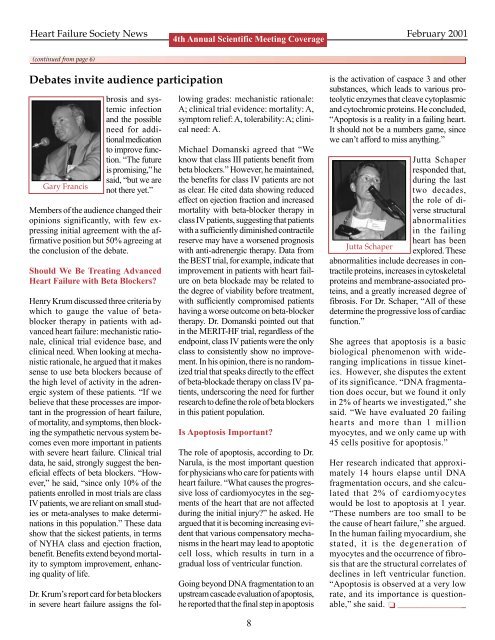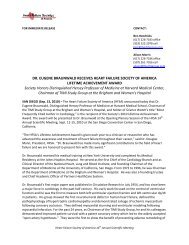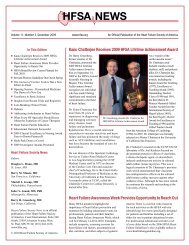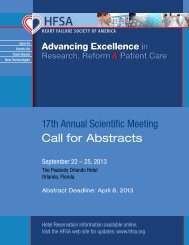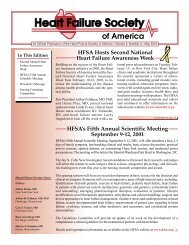Volume 3, Number 1 - Heart Failure Society of America
Volume 3, Number 1 - Heart Failure Society of America
Volume 3, Number 1 - Heart Failure Society of America
Create successful ePaper yourself
Turn your PDF publications into a flip-book with our unique Google optimized e-Paper software.
<strong>Heart</strong> <strong>Failure</strong> <strong>Society</strong> News February 2001<br />
4th Annual Scientific Meeting Coverage<br />
(continued from page 6)<br />
Debates invite audience participation<br />
Gary Francis<br />
brosis and systemic<br />
infection<br />
and the possible<br />
need for additional<br />
medication<br />
to improve function.<br />
“The future<br />
is promising,” he<br />
said, “but we are<br />
not there yet.”<br />
Members <strong>of</strong> the audience changed their<br />
opinions significantly, with few expressing<br />
initial agreement with the affirmative<br />
position but 50% agreeing at<br />
the conclusion <strong>of</strong> the debate.<br />
Should We Be Treating Advanced<br />
<strong>Heart</strong> <strong>Failure</strong> with Beta Blockers?<br />
Henry Krum discussed three criteria by<br />
which to gauge the value <strong>of</strong> betablocker<br />
therapy in patients with advanced<br />
heart failure: mechanistic rationale,<br />
clinical trial evidence base, and<br />
clinical need. When looking at mechanistic<br />
rationale, he argued that it makes<br />
sense to use beta blockers because <strong>of</strong><br />
the high level <strong>of</strong> activity in the adrenergic<br />
system <strong>of</strong> these patients. “If we<br />
believe that these processes are important<br />
in the progression <strong>of</strong> heart failure,<br />
<strong>of</strong> mortality, and symptoms, then blocking<br />
the sympathetic nervous system becomes<br />
even more important in patients<br />
with severe heart failure. Clinical trial<br />
data, he said, strongly suggest the beneficial<br />
effects <strong>of</strong> beta blockers. “However,”<br />
he said, “since only 10% <strong>of</strong> the<br />
patients enrolled in most trials are class<br />
IV patients, we are reliant on small studies<br />
or meta-analyses to make determinations<br />
in this population.” These data<br />
show that the sickest patients, in terms<br />
<strong>of</strong> NYHA class and ejection fraction,<br />
benefit. Benefits extend beyond mortality<br />
to symptom improvement, enhancing<br />
quality <strong>of</strong> life.<br />
Dr. Krum’s report card for beta blockers<br />
in severe heart failure assigns the following<br />
grades: mechanistic rationale:<br />
A; clinical trial evidence: mortality: A,<br />
symptom relief: A, tolerability: A; clinical<br />
need: A.<br />
Michael Domanski agreed that “We<br />
know that class III patients benefit from<br />
beta blockers.” However, he maintained,<br />
the benefits for class IV patients are not<br />
as clear. He cited data showing reduced<br />
effect on ejection fraction and increased<br />
mortality with beta-blocker therapy in<br />
class IV patients, suggesting that patients<br />
with a sufficiently diminished contractile<br />
reserve may have a worsened prognosis<br />
with anti-adrenergic therapy. Data from<br />
the BEST trial, for example, indicate that<br />
improvement in patients with heart failure<br />
on beta blockade may be related to<br />
the degree <strong>of</strong> viability before treatment,<br />
with sufficiently compromised patients<br />
having a worse outcome on beta-blocker<br />
therapy. Dr. Domanski pointed out that<br />
in the MERIT-HF trial, regardless <strong>of</strong> the<br />
endpoint, class IV patients were the only<br />
class to consistently show no improvement.<br />
In his opinion, there is no randomized<br />
trial that speaks directly to the effect<br />
<strong>of</strong> beta-blockade therapy on class IV patients,<br />
underscoring the need for further<br />
research to define the role <strong>of</strong> beta blockers<br />
in this patient population.<br />
Is Apoptosis Important?<br />
The role <strong>of</strong> apoptosis, according to Dr.<br />
Narula, is the most important question<br />
for physicians who care for patients with<br />
heart failure. “What causes the progressive<br />
loss <strong>of</strong> cardiomyocytes in the segments<br />
<strong>of</strong> the heart that are not affected<br />
during the initial injury?” he asked. He<br />
argued that it is becoming increasing evident<br />
that various compensatory mechanisms<br />
in the heart may lead to apoptotic<br />
cell loss, which results in turn in a<br />
gradual loss <strong>of</strong> ventricular function.<br />
Going beyond DNA fragmentation to an<br />
upstream cascade evaluation <strong>of</strong> apoptosis,<br />
he reported that the final step in apoptosis<br />
is the activation <strong>of</strong> caspace 3 and other<br />
substances, which leads to various proteolytic<br />
enzymes that cleave cytoplasmic<br />
and cytochromic proteins. He concluded,<br />
“Apoptosis is a reality in a failing heart.<br />
It should not be a numbers game, since<br />
we can’t afford to miss anything.”<br />
Jutta Schaper<br />
responded that,<br />
during the last<br />
two decades,<br />
the role <strong>of</strong> diverse<br />
structural<br />
abnormalities<br />
in the failing<br />
heart has been<br />
Jutta Schaper<br />
explored. These<br />
abnormalities include decreases in contractile<br />
proteins, increases in cytoskeletal<br />
proteins and membrane-associated proteins,<br />
and a greatly increased degree <strong>of</strong><br />
fibrosis. For Dr. Schaper, “All <strong>of</strong> these<br />
determine the progressive loss <strong>of</strong> cardiac<br />
function.”<br />
She agrees that apoptosis is a basic<br />
biological phenomenon with wideranging<br />
implications in tissue kinetics.<br />
However, she disputes the extent<br />
<strong>of</strong> its significance. “DNA fragmentation<br />
does occur, but we found it only<br />
in 2% <strong>of</strong> hearts we investigated,” she<br />
said. “We have evaluated 20 failing<br />
hearts and more than 1 million<br />
myocytes, and we only came up with<br />
45 cells positive for apoptosis.”<br />
Her research indicated that approximately<br />
14 hours elapse until DNA<br />
fragmentation occurs, and she calculated<br />
that 2% <strong>of</strong> cardiomyocytes<br />
would be lost to apoptosis at 1 year.<br />
“These numbers are too small to be<br />
the cause <strong>of</strong> heart failure,” she argued.<br />
In the human failing myocardium, she<br />
stated, it is the degeneration <strong>of</strong><br />
myocytes and the occurrence <strong>of</strong> fibrosis<br />
that are the structural correlates <strong>of</strong><br />
declines in left ventricular function.<br />
“Apoptosis is observed at a very low<br />
rate, and its importance is questionable,”<br />
she said. ❏ _______________<br />
8


